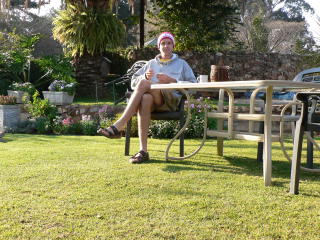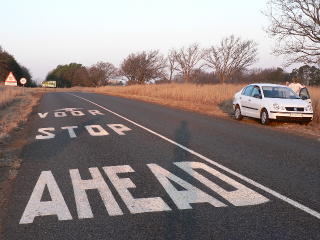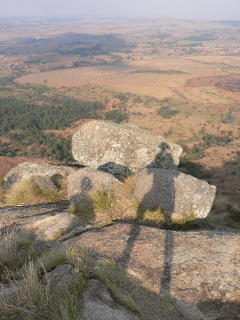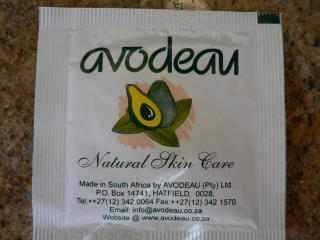
Tuesday, 9 August 2005 - Women's Day in SA (a National Holiday)
Dear family and friends,
Hello from sunny South Africa! (I will be saying that until November, apparently. I don't recall seeing a cloud since I got here). First things first: I miss you all terribly, and am thinking about you lots. The intrepid days of my early 20s, when I could fearlessly turn my back on home to immerse myself fully in new cultures and languages are over – I would like to stay in touch this time, so don't forget to write!! From my end, I have become a Blogger.
Welcome to my Blog :)
For those of you who missed this bit, I am in Pretoria, South Africa for the next 6 months. I have been employed at great expense* by the World Conservation Union (IUCN) South Africa Country Office to assist with their activities here. In particular, I will be involved in an initiative within their Sustainable Livelihoods Programme to develop opportunities, through policy research, capacity-building and other as-yet vague-sounding activities, for poor people to earn a living through environmentally sustainable enterprises. Although the raised eyebrows that are everyone's favorite response to the S-word have instilled in me some amount of self-conciousness, this is a topic that genuinely interests me and I am quite excited to learn as much as I possibly can about it while I'm here.
* The stipend should, if I'm very careful, cover my costs.
Pretoria, the state capital, is named after a Andries Pretorious, who founded it some time after leading a small group of “voertrekkers” in the slaughter of some thousands of attacking Zulus at Blood River. The voertrekkers were Afrikaans-speaking white farmers and pastoralists who were alienated by British rule in the Cape region of the country and so chose to move north to establish an autonomous state for themselves. This movement occurred in the middle of the 19th century, and became known as the Great Trek. Pretorius was just one of a number of heroic figures who fought to preserve a distinctive culture for this small and embattled minority. In honour of his determination, and for the principles of racial hierarchy that he defended, the voertrekkers and their decendents persisted despite the odds, and eventually achieved what they sought a century later in the apartheid state of South Africa.
My first few days here have been a bit hazy, and I still don't think I've quite recovered from the jet-lag; nor from the spot of bronchitis which is the inevitable cost for a week of singing and shouting at The Best Place on Earth (a.k.a. Camp), where I played before leaving. However, here are some first impressions, along with photos for some scene-setting (rather than artistic! – those will come later I hope) value.
The First Impression: South African Airlines runs the slowest check-in procedure in the industry (2hrs). But, to be fair, they may have been distracted by the British police with really big guns at Heathrow. Also, they had been on strike until a few days previous.
Impression #2 (on waking up and looking out the window towards the end of the flight): Wow…! I couldn't even understand what I was looking at at first, it was so foreign. Eventually I figured out that it was alternating lines of sand and low scrub (maybe some trees? hard to tell from that height) extending as far as the eye could see. And absolutely nothing else for about 10 minutes, before we crossed a road, followed by more of nothing.
Impression #3: South African customs is really slow also (1.5hrs). I guess I'd better get used to standing in line!
Other wild generalizations: South Africans smoke like Europeans (that is, a lot); they are stand-off'ish and don't make a lot of eye-contact with strangers, but are extremely animated and warm towards people they know; their speech is a soft mumble which, combined with the accent, verges at times on incomprehensible; they drive fast down the wrong side of the street.
Security was a major point of interest (shall we say) for me before coming, and is obviously an issue for the people of Pretoria also. Although everyone says that this city is quite safe, and it does seem to be, I am still told not to go out on foot at night (which comes at 6pm). Every single house has some form of security, from the simple cement wall which one could hop over in a couple seconds, to the razor wire-topped electric fences, bars on the windows, and large, well-trained dogs. I haven't figured out what the appropriate degree of caution is, but hope that in my case it will diminish rather than intensify: even on a high-density Pretoria street in the middle of the day I felt nervous pulling out my camera; I am sure that this is an over-reaction.
For the next month at least I am living at a very nice B&B. The second B consisting every morning of tropical fruit salad, roibos (red) tea, bacon and eggs, and exciting selections of yoghurt, such as passionfruit! I have discovered a beautiful outdoor pool a short walking detour between home and work, and am just blocks away from a large expanse of sports fields on the university campus. So my hopes for staying active while I'm here are high (I had been concerned about this in light of the security issue).
Pretoria is an almost exclusively affluent city of students, business and, of course, political elite (of all colours) as well as a large international community – in particular Scandinavians and Germans, as well as Americans working at the embassy (all CIA operatives, of course). Still, I have met many people asking for money on the streets, but one could hardly call them beggars. They are usually well-dressed and upright, and have approached me with original and seemingly reasonable appeals for assistance: their car has run out of fuel (“that one just there, across the street"); they need to hire a lawyer (“here are my documents”). I am disarmed by their dignity, and haven't yet figured out how to respond. Simply walking past seems disrespectful, and so far I have stopped each time to listen to their case. But already I am feeling the same coolness I experienced within myself while travelling in Southeast Asia, where ever interaction with a local seemed to revolve around money. It is discouraging, and I have taken to saving my 1 Rand coins (worth about 20cents) in a pocket for easy access, as well as refining my line: “Here you are; I'm sorry, I know it isn't much; Have a nice day.” I am hoping this will achieve a balance between feelings of guilt on the one hand, and being taken advantage of on the other.
I was surprised the other day at being greeted as “Masta” by an elderly black man on my street. Perhaps he was saying Mister, but I heard “Master.” The imagery worked, too, as I in my Birks and sunglasses strode past he in blue coveralls and orange touque, fingers in the dirt. In any case, and despite myself (I submit!) I felt my status temporarily elevated, and was struck as I have been all week by where this country has come from (only 15 years or so have passed since apartheid), as well as how far it has to go to become (at least an approximation of) an egalitarian society.
But I need to remind myself to temper my eager analysis of South Africa 2005 as I walk the leafy streets of Hatfield, Pretoria's university-and-embassy neighbourhood. As I understand it, the view from here of South Africa's situation is the in-studio, digitally enhanced version, and I won't be able to sense the true nature of the place until I have ventured at least as far as Johannesburg, 50km south. I have it from reliable sources that Jo'burg is “scary as hell,” but also much more vibrant and interesting than the capital.
The best national paper, I am told, is the Mail and Guardian, which is only printed once a week each Friday but also has a good website updated daily. I had a read over coffee on Saturday, and was pleased to discover that the M&G is even more left-leaning than the Globe and Mail! The news sections read like editorials, and the editorials are meandering and – to this uninitiated reader at least, often unsubstantiated – rants (the standards here comparing favourably with those of the National Post…kidding). The national section was taken over this week with updates and editorials on the “Oilgate” scandal – something to do with bribery charges levelled (by the M&G, incidentally) against the state-owned oil company, followed up with a suspiciously weak attempt at an investigation and no findings of guilt. The Africa and International sections were better. Lots on the death of John Gurang in Sudan, of course (much concern about the future of the new-found peace with this charismatic former rebel leader gone) and Mugabge's urban “clean-up” plan in Zimbabwe (demolishing people's homes, that is, not picking up garbage). The USA seems to be a favorite subject for debate. This week it was featured for its share of the “odious” loans that now burden so many African countries with foreign debt, as well as its responsibility for the coming proliferation of nuclear weapons.
Go here for some photos of Pretoria, including the B&B that will be my home for the next 6 months, a rugby game I came across by chance, and the local pool:
http://ca.pg.photos.yahoo.com/ph/philipkakins/album?.dir=/610f





